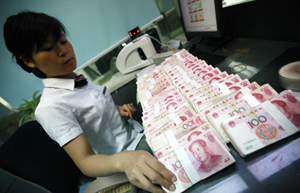BEIJING - China's funds outstanding for foreign exchange fell unexpectedly in August, underscoring short-term pressure of capital outflow, according to data released Monday by the People's Bank of China (PBOC).
Considered part of China's broad money supply, funds for foreign exchange stood at 29.5 trillion yuan ($4.79 trillion) by the end of August, down 31.2 billion yuan from a month ago, the PBOC data showed.
The decline in August reversed a growth in funds for foreign exchange seen in July, according to the PBOC, China's central bank.
The decline surprised many analysts, as China's trade surplus in August jumped 77.8 percent year on year to an all-time high of $49.8 billion, according to data released by the General Administration of Customs last week.
"The decline of funds for foreign exchange in August is beyond our expectation," said Zhong Zhengsheng, a macroeconomic analyst with Guosen Securities. "On one hand, the trade surplus in August reached new high; on the other hand, the yuan has kept appreciating in the month."
A warming domestic equity market ahead of the linking of Shanghai and Hong Kong stock exchanges also made the decline a little bit hard to understand.
The benchmark Shanghai Composite Index gained 1.5 percent in August as overseas investors were eager to build up their stock positions in China's A-share market to profit from the Shanghai and Hong Kong arrangement.
If the inflow of foreign capital continues, as suggested by the trade data, Zhong said, the only way to explain the drop was that Chinese individuals are more willing to hold foreign exchange.
The pessimistic outlook on China's economy may lead to worries that the yuan will depreciate, Zhong said.
Lian Ping, chief economist at the Bank of Communications, said the widening trade surplus and warming stock market failed to offset bad news of across-the-board weakness of economic indicators in August.
"Worries about China's economy had worsened. The property market was slowing down, the foreign direct investment was heading for a decline while the US dollar was on the rise," Lian said. "All those factors made Chinese companies and individuals more reluctant to sell foreign exchange assets.
|
 |
 |
| New yuan loan growth dips in Aug | China 2013 outbound investment hits record high |
